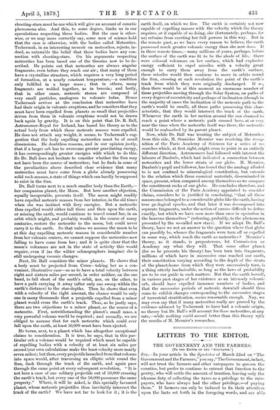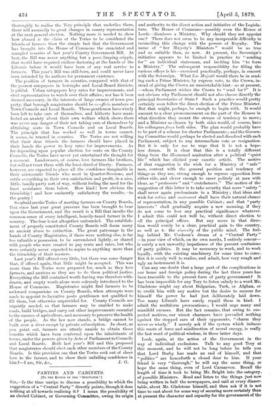LETTERS TO THE EDITOR.
THE GOVERNMENT AND THE FARMERS.
[TO THE EDITOR OF THE " SPECTATOR.") SIR,—In your article in the Spectator of March 22nd on "The Government and the Farmers," you say," The Government, in fact, will not trust the farmers and other ratepayers to govern the counties, but prefer to continue to entrust that function to the gentry, who will settle the amount of taxation, leaving only the irksome duty of collecting the taxes as a privilege to the rate- payers, who have always had the other privilege,—of paying them." If farmers can only be induced to fix their attention upon the facts set forth in the foregoing words, and are able
thoroughly to realise the Tory principle that underlies them, there will assuredly be great changes in county representation at the next general election. Nothing more is needed to show how absurd is the claim of the Tories to be considered the friends of farmers than the simple fact that the Government has brought into the House of Commons the emaciated and mangled remains of last year's Colinty Government Bill. At best, the Bill was never anything but a poor, limping cripple, that would have required endless doctoring at the hands of the Liberals before it would have been of any real service to farmers. This year's Bill was still-born, and could never have been intended by its authors for permanent existence.
The position of farmers in counties, compared with that of the poorest ratepayers in boroughs and Local-Board districts, is pitiful. Urban ratepayers levy rates for improvements, and elect representatives to watch over their affairs ; nor has it been deemed necessary, in the interests of large owners of town pro-
perty, that borough magistrates should be ex-officio members of
Town Councils and Local Boards. These gentlemen have wisely been left to take care of themselves, and hitherto have mani- fested an anxiety about their own welfare which shows there was never any danger of their not taking care of themselves by obtaining seats in Town Councils and on Local Boards. The principle that has worked so well in towns cannot, it seems, be trusted in counties. The Tories are not willing that their dear friends the farmers should have placed in their hands the power to levy rates for improvements. As for depending upon popular election for seats on the County Councils, the Tories have never yet entertained the thought for a moment. Landowners, of course, love farmers like brothers, but will not trust them with the least shred of liberty. Farmers, however, are expected to place all the confidence imaginable in their aristocratic friends who meet in Quarter-Sessions, and settle everything to their own satisfaction and profit, in a nice, little, family-party sort of way, without feeling the need for the least assistance from below. How kind ! how obvious the friendship ! and how eminently satisfactory the results,—to the gentry !
So afraid are the Tories of meeting farmers on County Boards, that since last• year great pressure has been brought to bear upon the Government, and the result is a Bill that insults the common-sense of every intelligent, heavily-taxed farmer in the country. The fear is not altogether unfounded. The establish- ment of properly constituted County Boards will doom many an ancient abuse to extinction. The great patronage in the hands of County Magistrates, if there were nothing else, is far too valuable a possession to be surrendered lightly, or shared with people whe were created to pay rents and rates, but who were certainly never expected to aspire to anything more than the friendship of their masters.
Last year's Bill offered very little, but there was some danger that, if offered again, that little might be accepted. This was more than the Tories were prepared for, much as they love farmers, and anxious as they are to do them political justice. Everything the Bill contained worth having was therefore with- drawn, and empty words alone were solemnly introduced to the House of Commons. Magistrates might find farmers to be awkward companions on County Boards, when attempts were made to appoint to lucrative posts gentlemen not qualified to fill them, but otherwise unprovided for. County Councils are urgently needed, so that farmers may be enabled to make roads, build bridges, and carry out other improvements essential to the success of agriculture, and necessary to preserve the health of the people. As the law now stands, a bridge cannot be built over a river except by private subscription. In short, as you point out, farmers are utterly unable to obtain those benefits which have been conferred upon the inhabitants of towns, under the powers given by Acts of Parliament to Councils and Local Boards. Both last year's Bill and this proposed that magistrates should elect each other members of the County Boards. Is this provision one that the Tories seek out of sheer love to the farmer, and to show their unfailing confidence in



































 Previous page
Previous page